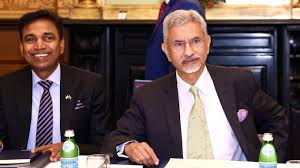India slammed Canada’s move to ban Australia Today, hours after it aired External Affairs Minister S Jaishankar’s remarks on Khalistani extremism in Canada, saying it highlighted Ottawa’s hypocrisy towards freedom of speech.
Canada has banned Australia Today, hours after the outlet aired External Affairs Minister S Jaishankar’s press conference in Australia, where he gave remarks on the India-Canada diplomatic standoff and Khalistani extremism in Canada. In a hard-hitting response, India on Thursday said it was surprised by Canada’s move to ban the outlet and stressed that it highlighted Ottawa’s hypocrisy towards freedom of speech.
Earlier in the day, Australia Today, an important outlet for the Indian community in the country, had aired the joint press conference of Jaishankar and his Australian counterpart Penny Wong in Canberra.
“We understand that the social media handles, pages of this particular outlet, which is an important diaspora outlet, have been blocked and are not available for viewers in Canada. This happened just an hour or a few hours after this particular handle carried the press conference of S Jaishankar with Penny Wong. We were surprised. It looks strange to us,” Ministry of External Affairs spokesperson Randhir Jaiswal said at a weekly media briefing in Delhi.”But, nonetheless, what I will say is that these are actions which yet again highlight the hypocrisy of Canada towards freedom of speech. You would have seen that the External Affairs Minister, in his media engagements, spoke about three things. One was Canada making allegations and a pattern had developed without any specific evidence. The second thing he highlighted was surveillance of Indian diplomats happening in Canada, which he termed as unacceptable,” he said.
“But, nonetheless, what I will say is that these are actions which yet again highlight the hypocrisy of Canada towards freedom of speech. You would have seen that the External Affairs Minister, in his media engagements, spoke about three things. One was Canada making allegations and a pattern had developed without any specific evidence. The second thing he highlighted was surveillance of Indian diplomats happening in Canada, which he termed as unacceptable,” he said.

